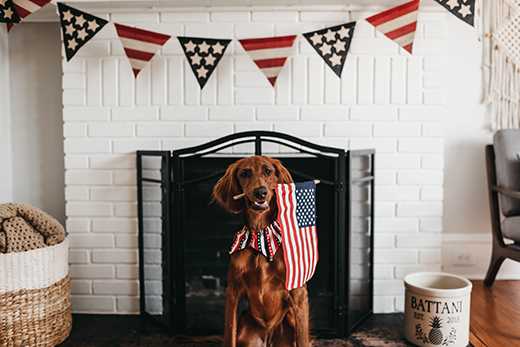Kansas State University veterinarian offers Fourth of July pet tips
Friday, June 30, 2023

Susan Nelson, clinical professor at the Veterinary Health Center in K-State's College of Veterinary Medicine, offers tips to keep pets safe during the Fourth of July holiday.
MANHATTAN — While many people enjoy the fun and noisy celebrations of the Fourth of July, for many pets it is a time of fear and anxiety as well as other dangers, according to a Kansas State University veterinarian.
Susan Nelson, clinical professor at the Veterinary Health Center in the College of Veterinary Medicine, said one of the best things you can do is to keep your pet indoors at all times and keep them under leash control when you do need to take them outside.
"The sound of fireworks can make some pets run off in an attempt to get away from the noise," Nelson said. "This is the time of year with the highest incidences of runaway pets, so be sure to keep them secure."
In addition to the risk of getting lost if they run away, Nelson said there is also the risk of your pet being hit by a car, as their fear of fireworks will make them less observant of oncoming traffic. She advises pet owners to ensure their pet has some type of ID, such as a tag and/or microchip — ideally both, as tags can get lost and microchips can sometimes stop working or get missed on a scan — in case the pet gets lost.
Nelson said keeping your pet inside also keeps it safe from people who may try to harm an animal with fireworks.
Keeping your dogs in the safe confines of their crates or a secure room is all that is needed to make some dogs feel less anxious. Be sure to close the blinds or use heavy curtains to block out the flashes of light.
Nelson offers some tips for helping pets cope with their fear of the loud bangs, whistles and crackles that come with the holiday, including:
• Play soothing music or turn on the TV or white noise machine to attempt to block out the noise.
• Distract from the noise and commotion with food puzzles and stuffed Kongs.
• Try an anxiety wrap specially made for pets to help calm those with mild anxiety, or use the wrap in addition to medications for those with moderate to severe noise phobias.
• Use over-the-counter supplements made for anxious pets to benefit those with mild to moderate noise anxiety. Note that some of these treatments need to be started several days ahead of the holiday for best effectiveness.
• Consider temporarily relocating your pet to a quieter place, such as a friend or relative's house or kennel, during this time.
• Talk to your veterinarian about prescription anti-anxiety medications if your pet has a moderate to severe noise phobia. Several medications are available to help treat anxiety from loud noises. Have the medication ready to give on the first day that fireworks are allowed to begin in your community. It is best to speak to your veterinarian now about medication options as offices may be closed early for the holiday.
Nelson said it is important to keep dangerous holiday items out of your pet's reach and not apply products on pets that aren't labeled for safe use on them. These include lighters, punks, matches, lighter fluid, glow jewelry, citronella candles/oils, insect coils and repellants, and fireworks — both unlit and lit.
"Even if your dog is not bothered by fireworks, it is still subject to being burned or injured by fireworks if it gets too close or attempts to retrieve one that has been ignited," said Nelson.
Some fireworks remain very hot for some time after being ignited and discharged, and many fireworks contain toxic chemicals if ingested.
Some insect repellants are not safe for your pets, either, Nelson said.
"Mosquitoes are very prevalent this time of year, but don't be tempted to spray your pet with insect repellants that contain DEET as it is toxic to pets," she said. "Only apply insect repellants that state they are safe to use on pets."
Nelson said human foods and beverages also pose dangers to pets. According to the veterinarian, pets often experience vomiting and/or diarrhea when given foods they are not used to eating, and some foods — such as chocolate, macadamia nuts, onions, grapes or raisins, coffee, salt and yeast-based bread dough — are also toxic for pets.
"When ingested, fatty foods can lead to life-threatening pancreatitis, while corncobs, bones and wooden barbeque skewers can cause blockage of the intestinal tract if swallowed," Nelson said. "Keep any foods or candies sweetened with artificial sweeteners, such as xylitol, out of reach as they can lead to life-threatening low blood sugar and liver failure"
Alcoholic beverages are also unsuitable for pets — Nelson advises keeping the beer and wine well out of their reach.
In the midst of intense summer heat, Nelson also recommends watching your pets closely for any signs of overheating if they are outside with you.
